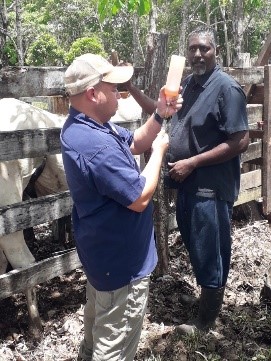Bovine Vaccination and Deworming Plan
The Health Plan is primarily focused on controlling, preventing, and eradicating diseases and parasites that affect the different livestock production systems.
Management, vaccination, and deworming schedules are general and should be adapted and interpreted for each specific farm or region, as the epidemiology of a disease varies from one region or country to another and even among farms. Below is an illustration of a general health plan for your cattle.
Current active members by district:
| Disease | Age of Vaccination (months) | Route of administration | Dosage | Revaccination time |
|---|---|---|---|---|
| Rabies | 3 | Intramuscular | 2ml | Yearly |
| Blackleg – Clostridium | 2 | Subcutaneous/Intramuscular | 5ml | Booster in 3-4 weeks after first dose. Then yearly. |
| Parasites | Frequency | Comments |
|---|---|---|
| Internal Parasites | 2-3 times a year depending on parasite load. | Calves are typically dewormed at 3 months of age. Deworming at 5 months of age, before weaning is recommended which will help reduce the parasite burden during this stressful period. |
| External Parasites | Every 3 weeks to break the tick life cycle effectively. | Once control is achieved, the frequency of treating for ticks will decrease to 1-2 months. Ticks are more present in warmer months like March-June. Pasture management and rotational grazing can help reduce tick populations and decrease the need for frequent spraying. |
These vaccination schedules can vary based on local disease prevalence, vaccine type available in Belize and veterinary advice. Always consult with a veterinarian to determine the best vaccination strategy for your herd.
Remember to maintain accurate records of vaccination dates, types of vaccines administered, and individual animal identification. Regularly monitor the health status of the herd for signs of rabies or blackleg and report any suspected cases of rabies or blackleg to BLPA for further investigation.

